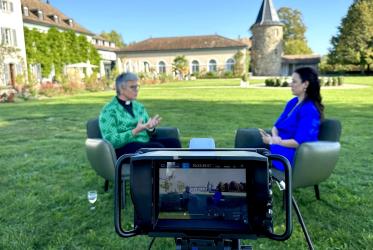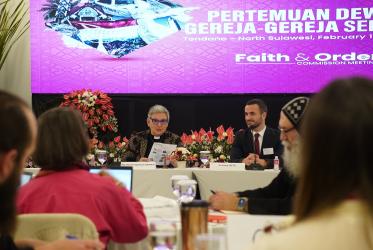by Rev. Dr Dagmar Heller, Evangelical Church in Germany
Easter is celebrated on the first Sunday following the first full moon after the equinox in March. This is an ancient rule from the fourth century, which is followed by all the churches around the globe. What is not well-known, especially in regions with a Protestant or Catholic majority, is that within Christianity, Easter is celebrated twice, depending on whether the (older) Julian calendar or the Gregorian calendar is used in order to identify the date of the equinox and full moon following it.
The fact that the two dates coincide in 2001, at the beginning of the new millenium, has raised the hope that this could be the start of a common celebration of the central event of our Christian faith every year. But at the same time it is already clear from the recent discussions taking place in the ecumenical movement, that a decision among the churches concerning a common date for Easter will not happen in the near future, although there is already a certain history on this topic and a proposed solution is on the table.
The proposal has the advantage that it asks for change on both sides and does not impose one side's solution on the other. It suggests that the churches use neither the Julian nor the Gregorian calendar for reckoning the date of the spring equinox and of the full moon, but take the exact astronomical data that can be provided nowadays in contrast to the times when the Julian and the Gregorian calendars were invented. The problem with this proposal is that this still means a bigger change for those churches using the Julian calendar than for the others because the Gregorian calendar is already much closer to the astronomically exact constellation.
A change poses practical problems. But what is more important is that, for some Orthodox, the calendar is so closely related to the tradition that changes are unthinkable. Also in the background is the deep trauma in the East, caused by some attitudes of the West throughout history, which has resulted in a deeply rooted anti-Western suspicion. Although the proposal was first made by a pan-Orthodox meeting, the fact that only few changes are implied for the Western churches gives the impression, at first sight, that it means taking on the Gregorian calendar. The Orthodox churches have made it very clear that they would need more time in order to prepare their people.
Thus we can say: Although the question of the date of Easter is a purely practical one, it seems that the situation in some churches at present does not allow for a change without risking a schism.
Therefore a lot of patience is necessary for people involved in this discussion. It seems to me though that the coming twenty years provide a special opportunity to further work on this question, since during that period the coincidence of the two dates will happen several times (in 2004, 2007, 2010, 2011, 2014, 2017). Couldn't this be taken as a sign for the churches to take this as a "kairos" for a move towards a common date? If it is not possible to put the proposal described above into practice, could we find ways for regional solutions? Or could the Western churches for the sake of unity take over the Julian date for Easter, as a group in Austria suggested?
But many churches, especially from the Western tradition but also one of the Oriental Orthodox churches have expressed their willingness to follow the above-mentioned proposal if all the other churches could agree on it. In this sense the Western churches took a step towards the Orthodox side by agreeing to keep the ancient rule, while in earlier discussions they had tended to propose a third way (which would mean in fact a third date!) by suggesting to fix the date of Easter on a specific Sunday in April.
This shows that attitudes can change, and churches can take steps towards one another. The discussion on the date of Easter, and hope for a solution, therefore need to continue.
The fact that Easter is celebrated on the same date this year has raised some interest in the Western churches, at least as far as I can see in my own context in Germany. The National Council of Churches in Germany (ACK) has provided a proposal for an ecumenical vespers worship service for Easter. And many churches are encouraging their congregations to mark this event in one way or the other. This is a hopeful sign which shows that people have understood how important it is that Christians celebrate their central feast together in order to give a credible witness to the world, especially in times where Christians more and more live in a minority situation or in secularised contexts.
In early 2001, the WCC Public Information Team asked knowledgeable representatives of the Orthodox, Roman Catholic and Protestant traditions to give a brief outline of their thinking on a common date for Easter. The series began with this article by the Rev. Dr Dagmar Heller, executive secretary for Mission and Ecumenical Relations in North Baden, Evangelical Church in Baden, Germany. As a WCC staff member with the "Faith and Order" team, she had been involved in organizing and accompanying the discussion process on a common date for Easter.




